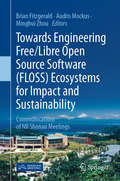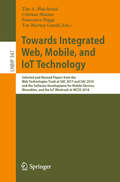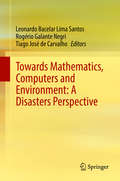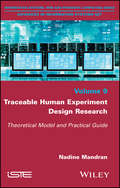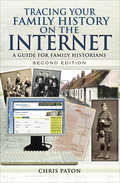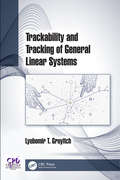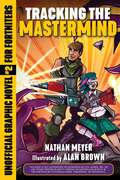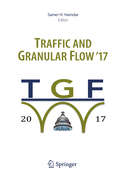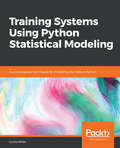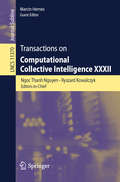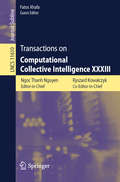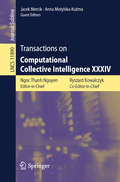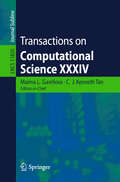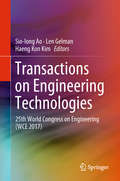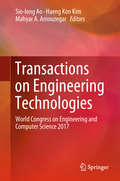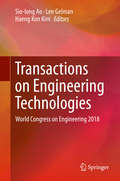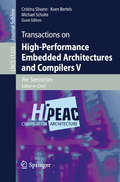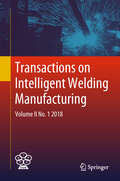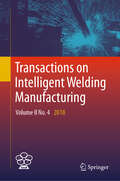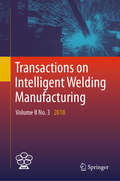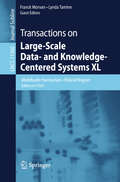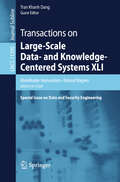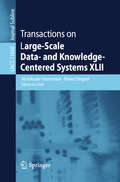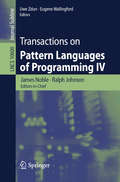- Table View
- List View
Towards Engineering Free/Libre Open Source Software (FLOSS) Ecosystems for Impact and Sustainability: Communications of NII Shonan Meetings
by Brian Fitzgerald Audris Mockus Minghui ZhouFree/libre open source software (FLOSS) ecosystems such as Linux have had a tremendous impact on computing and society and have captured the attention of businesses, researchers, and policy makers. Research on FLOSS has been ongoing for almost two decades. From an economic perspective, the most common topics involve motivation and organization. As commercial participation in FLOSS has become common, the question of how to combine FLOSS practice with commercial practice has been the subject of research, particularly with a view to understanding how to ensure sustainability of the ecosystem. This book is based on a Shonan meeting on FLOSS ecosystem sustainability held in June 2017. The meeting brought together a blend of established and young researchers who were actively studying the FLOSS phenomenon. These researchers were drawn from a variety of disciplines including software engineering, human computer interaction, information systems, computer-supported cooperative work, data mining, cognitive science, psychology, operations research, and management. Industry practitioners who were active in the FLOSS space also participated. This book presents the results of discussion on fundamental questions related to the impact and sustainability of FLOSS ecosystems, including: · How does an ecosystem form? How do different stakeholders work together to form a community that develops and maintains valuable and freely available software, and how does an ecosystem with millions of repositories and developers operate given the lack of centralized planning? · How does an ecosystem evolve in response to the environment as technology and needs evolve over time?· How do newcomers learn the protocols and practices of an ecosystem? How would they sustain the ecosystem? What is the relationship between people and ecosystem sustainability?
Towards Integrated Web, Mobile, and IoT Technology: Selected and Revised Papers from the Web Technologies Track at SAC 2017 and SAC 2018, and the Software Development for Mobile Devices, Wearables, and the IoT Minitrack at HICSS 2018 (Lecture Notes in Business Information Processing #347)
by Tim A. Majchrzak Cristian Mateos Francesco Poggi Tor-Morten GrønliThis book deals with integrated Web, mobile, and IoT technologies. Novel approaches and techniques, new tools and frameworks are needed to address the increasing complexity of the distributed computing paradigms that are coming and the applications therein.This volume contains selected and extended papers from a) the Web Technologies track at the 33rd ACM/SIGAPP Symposium On Applied Computing, b) the Web Technologies track at the 32nd ACM/SIGAPP Symposium On Applied Computing, and c) the Software Development for Mobile Devices, Wearables, and the Internet-of-Things Minitrack at the 51st Hawaii International Conference on System Sciences. Overall, it provides a uniform view of cutting-edge research in Web, mobile and IoT technologies.
Towards Mathematics, Computers and Environment: A Disasters Perspective
by Leonardo Bacelar Lima Santos Rogério Galante Negri Tiago José de CarvalhoWith relevant, timely topics, this book gathers carefully selected, peer-reviewed scientific works and offers a glimpse of the state-of-the-art in disaster prevention research, with an emphasis on challenges in Latin America. Topics include studies on surface frost, an extreme meteorological event that occasionally affects parts of Argentina, Bolivia, Peru, and southern Brazil, with serious impacts on local economies; near-ground pollution concentration, which affects many industrial, overpopulated cities within Latin America; disaster risk reduction and management, which are represented by mathematical models designed to assess the potential impact of failures in complex networks; and the intricate dynamics of international armed conflicts, which can be modeled with the help of stochastic theory. The book offers a valuable resource for professors, researchers, and students from both mathematical and environmental sciences, civil defense coordinators, policymakers, and stakeholders.
Traceable Human Experiment Design Research: Theoretical Model and Practical Guide
by Nadine MandranThe aim of this book is to describe the methodology of conducting the THEDRE research "Traceable Human Experiment Design Research". It applies to Research in Human Centered Informatics (RICH). These are areas of computer research that integrate users to build scientific knowledge and supporting tools for this research. As an example, we can mention the relevant fields such as Information Systems (IS), Human Machine Interfaces (HMI) Engineering, and Human Information Systems (HIA). The construction of this language and method is based on experiments conducted since 2008 in the field of RICH.
Tracing Your Family History on the Internet, Second Edition: A Guide for Family Historians (Tracing Your Ancestors Ser.)
by Chris PatonThis fully revised second edition of Chris Paton's best-selling guide is essential reading if you want to make effective use of the internet in your family history research. Every day new records and resources are placed online and new methods of sharing research and communicating across cyberspace become available, and his handbook is the perfect introduction to them. He has checked and updated all the links and other sources, added new ones, written a new introduction and substantially expanded the social networking section. Never before has it been so easy to research family history using the internet, but he demonstrates that researchers need to take a cautious approach to the information they gain from it. They need to ask, where did the original material come from and has it been accurately reproduced, why was it put online, what has been left out and what is still to come? As he leads the researcher through the multitude of resources that are now accessible online, he helps to answer these questions. He shows what the internet can and cannot do, and he warns against the various traps researchers can fall into along the way.As seen in Your Family Tree Magazine.
Tracing Your Irish Family History on the Internet, Second Edition: A Guide for Family Historians (Tracing Your Ancestors)
by Chris PatonA simple, easy-to-use guide to tracing your Irish ancestry via the Internet. In this, the fully updated second edition of his best-selling guide to researching Irish history using the Internet, Chris Paton shows the extraordinary variety of sources that can now be accessed online. Although Ireland has lost many records that would have been of great interest to family historians, he demonstrates that a great deal of information survived and is now easily available to the researcher. Thanks to the pioneering efforts of the Public Record Office of Northern Ireland, the National Archives of Ireland, organizations such as FindmyPast Ireland, Ancestry.co.uk, and RootsIreland and the volunteer genealogical community, an ever-increasing range of Ireland&’s historical resources are accessible from afar. As well as exploring the various categories of records that the family historian can turn to, Chris Paton illustrates their use with fascinating case studies. He fully explores the online records available from both the north and the south from the earliest times to the present day. Many overseas collections are also included, and he looks at social networking in an Irish context where many exciting projects are currently underway. Paton&’s book is an essential introduction and reference for anyone who is keen to trace their Irish roots.
Trackability and Tracking of General Linear Systems
by Lyubomir GruyitchTrackability and Tracking of General Linear Systems deals with five classes of the systems, three of which are new, begins with the definition of time together with a brief description of its crucial properties and with the principles of the physical uniqueness and continuity of physical variables. They are essential for the natural tracking control synthesis. The book presents further new results on the new compact, simple and elegant calculus that enabled the generalization of the transfer function matrix concept and of the state concept, the completion of the trackability and tracking concepts together with the proofs of the trackability and tracking criteria, as well as the natural tracking control synthesis for all five classes of the systems. Features • Crucially broadens the state space concept and the complex domain fundamentals of the dynamical systems to the control systems. • Addresses the knowledge and ability necessary to study and design control systems that will satisfy the fundamental control goal. • Outlines new effective mathematical means for effective complete analysis and synthesis of the control systems. • Upgrades, completes and essentially generalizes the control theory beyond the existing boundaries. • Provides information necessary to create and teach advanced inherently upgraded control courses.
Tracking the Mastermind: Unofficial Graphic Novel #2 for Fortniters (Storm Shield #2)
by Nathan MeyerThe second book in an exciting new series of Fortnite graphic novelsIdris, Kiki, Sarah, and Cody are known as The Stonewood Survivors. After launching a comm-satellite to serve as a beacon for others lost on the Island, they&’re hailed as heroes. But heroes&’ work never ends. Core to their mission of survival is uncovering information about the founder of the shadowy corporation, Vindertech. This they know: Dr. Vinderman is the mastermind behind a host of wonder weapons that includes Ray the Robot and, more importantly, humanity&’s last hope for survival, the Storm Shields. What they don&’t know is whether Dr. Vinderman is working for or against them. To get to the truth, they must paraglide over herds of ravenous Husks and Mist Monsters, land on the roof of Vindertech Research Labs, save the supercomputer servers housed there, and discover Dr. Vinderman&’s location. Nothing happens as planned, and soon they are trapped in a deadly game of hide and seek. Hunted by the maniacal sniper known as Teddy Bear, they enter storm-wracked Plankerton where, if they&’re not slaughtered by mutant fiends, they just might save the world—assuming they don&’t kill each other first! <P><P> <i>Advisory: Bookshare has learned that this book offers only partial accessibility. We have kept it in the collection because it is useful for some of our members. Benetech is actively working on projects to improve accessibility issues such as these.</i>
Traffic and Granular Flow '17
by Samer H. HamdarThis book presents 57 peer-reviewed papers from the 12th Conference on Traffic and Granular Flow (TGF) held in Washington, DC, in July 2017. It offers a unique synthesis of the latest scientific findings made by researchers from different countries, institutions and disciplines.The research fields covered range from physics, computer science and engineering and they may be all grouped under the topic of "Traffic and Granular Flow". The main theme of the Conference was: "From Molecular Interactions to Internet of Things and Smart Cities: The Role of Technology in the Understanding and the Evolution of Particle Dynamics".
Training Systems Using Python Statistical Modeling: Explore popular techniques for modeling your data in Python
by Curtis MillerLeverage the power of Python and statistical modeling techniques for building accurate predictive modelsKey FeaturesGet introduced to Python's rich suite of libraries for statistical modelingImplement regression, clustering and train neural networks from scratchIncludes real-world examples on training end-to-end machine learning systems in PythonBook DescriptionPython's ease of use and multi-purpose nature has led it to become the choice of tool for many data scientists and machine learning developers today. Its rich libraries are widely used for data analysis, and more importantly, for building state-of-the-art predictive models. This book takes you through an exciting journey, of using these libraries to implement effective statistical models for predictive analytics.You’ll start by diving into classical statistical analysis, where you will learn to compute descriptive statistics using pandas. You will look at supervised learning, where you will explore the principles of machine learning and train different machine learning models from scratch. You will also work with binary prediction models, such as data classification using k-nearest neighbors, decision trees, and random forests. This book also covers algorithms for regression analysis, such as ridge and lasso regression, and their implementation in Python. You will also learn how neural networks can be trained and deployed for more accurate predictions, and which Python libraries can be used to implement them.By the end of this book, you will have all the knowledge you need to design, build, and deploy enterprise-grade statistical models for machine learning using Python and its rich ecosystem of libraries for predictive analytics.What you will learnUnderstand the importance of statistical modelingLearn about the various Python packages for statistical analysisImplement algorithms such as Naive Bayes, random forests, and moreBuild predictive models from scratch using Python's scikit-learn libraryImplement regression analysis and clusteringLearn how to train a neural network in PythonWho this book is forIf you are a data scientist, a statistician or a machine learning developer looking to train and deploy effective machine learning models using popular statistical techniques, then this book is for you. Knowledge of Python programming is required to get the most out of this book.
Transactions on Computational Collective Intelligence XXXII (Lecture Notes in Computer Science #11370)
by Ngoc Thanh Nguyen Ryszard Kowalczyk Marcin HernesThese transactions publish research in computer-based methods of computational collective intelligence (CCI) and their applications in a wide range of fields such as the semantic web, social networks, and multi-agent systems. TCCI strives to cover new methodological, theoretical and practical aspects of CCI understood as the form of intelligence that emerges from the collaboration and competition of many individuals (artificial and/or natural). The application of multiple computational intelligence technologies, such as fuzzy systems, evolutionary computation, neural systems, consensus theory, etc., aims to support human and other collective intelligence and to create new forms of CCI in natural and/or artificial systems. This thirty-second issue presents 5 selected papers in the field of management, economics and computer science.
Transactions on Computational Collective Intelligence XXXIII (Lecture Notes in Computer Science #11610)
by Ngoc Thanh Nguyen Ryszard Kowalczyk Fatos XhafaThese transactions publish research in computer-based methods of computational collective intelligence (CCI) and their applications in a wide range of fields such as performance optimization in IoT, big data, reliability, privacy, security, service selection, QoS and machine learning. This thirty-third issue contains 9 selected papers which present new findings and innovative methodologies as well as discuss issues and challenges in the field of collective intelligence from big data and networking paradigms while addressing security, privacy, reliability and optimality to achieve QoS to the benefit of final users.
Transactions on Computational Collective Intelligence XXXIV (Lecture Notes in Computer Science #11890)
by Ngoc Thanh Nguyen Ryszard Kowalczyk Jacek Mercik Anna Motylska-KuźmaThese transactions publish research in computer-based methods of computational collective intelligence (CCI) and their applications in a wide range of fields such as performance optimization in IoT, big data, reliability, privacy, security, service selection, QoS and machine learning. This thirty-fourth issue contains 12 selected papers which present new findings and innovative methodologies as well as discuss issues and challenges in the field of collective intelligence in group decision making with special emphasize given to voting theory, power indices and graphs while addressing elections, social choices, IoT and allocation algorithms.
Transactions on Computational Science XXXIV (Lecture Notes in Computer Science #11820)
by Marina L. Gavrilova C. J. Kenneth TanThe LNCS journal Transactions on Computational Science reflects recent developments in the field of Computational Science, conceiving the field not as a mere ancillary science but rather as an innovative approach supporting many other scientific disciplines. The journal focuses on original high-quality research in the realm of computational science in parallel and distributed environments, encompassing the facilitating theoretical foundations and the applications of large-scale computations and massive data processing. It addresses researchers and practitioners in areas ranging from aerospace to biochemistry, from electronics to geosciences, from mathematics to software architecture, presenting verifiable computational methods, findings, and solutions, and enabling industrial users to apply techniques of leading-edge, large-scale, high performance computational methods. This, the 34th issue of the Transactions on Computational Science, contains seven in-depth papers focusing on research on data analytics using machine learning and pattern recognition, with applications in wireless networks, databases, and remotely sensed data.
Transactions on Engineering Technologies: Special Volume Of The World Congress On Engineering 2013 (Lecture Notes In Electrical Engineering #275)
by Sio-Iong Ao Len Gelman Haeng Kon KimThis volume contains a selection of revised and extended research articles written by prominent researchers participating in a large international conference on Advances in Engineering Technologies and Physical Science which was held in London, UK, 5-7 July, 2017. Topics covered include mechanical engineering, engineering mathematics, computer science, knowledge engineering, electrical engineering, wireless networks, and industrial applications. With contributions carefully chosen to represent the most cutting-edge research presented during the conference, the book offers the state of art in engineering technologies and physical science and applications, and also serves as an excellent reference work for researchers and graduate students working with/on engineering technologies and physical science and applications.
Transactions on Engineering Technologies: World Congress on Engineering and Computer Science 2017 (Lecture Notes In Electrical Engineering #275)
by Sio-Iong Ao Haeng Kon Kim Mahyar A. AmouzegarThis volume contains a selection of revised and extended research articles written by prominent researchers participating in a large international conference on Advances in Engineering Technologies and Physical Science which was held in San Francisco, California, USA, October 25-27, 2017. Topics covered include engineering mathematics, electrical engineering, communications systems, computer science, chemical engineering, systems engineering, manufacturing engineering, and industrial applications. With contributions carefully chosen to represent the most cutting-edge research presented during the conference, the book contains some of the state-of-the-art in engineering technologies and the physical sciences and their applications, and serves as a useful reference for researchers and graduate students working in these fields.
Transactions on Engineering Technologies: World Congress on Engineering 2018 (Lecture Notes In Electrical Engineering Ser. #275)
by Sio-Iong Ao Len Gelman Haeng Kon KimThis volume contains a selection of revised and extended research articles written by prominent researchers participating in The 26th World Congress on Engineering (WCE 2018) which was held in London, U.K., July 4-6, 2018. Topics covered include engineering mathematics, electrical engineering, communications systems, computer science, chemical engineering, systems engineering, manufacturing engineering, and industrial applications. With contributions carefully chosen to represent the most cutting-edge research presented during the conference, the book contains some of the state-of-the-art in engineering technologies and the physical sciences and their applications, and serves as a useful reference for researchers and graduate students working in these fields.
Transactions on High-Performance Embedded Architectures and Compilers V (Lecture Notes in Computer Science #11225)
by Per Stenström Cristina Silvano Koen Bertels Michael SchulteTransactions on HiPEAC aims at the timely dissemination of research contributions in computer architecture and compilation methods for high-performance embedded computer systems. Recognizing the convergence of embedded and general-purpose computer systems, this journal publishes original research on systems targeted at specific computing tasks as well as systems with broad application bases. The scope of the journal therefore covers all aspects of computer architecture, code generation and compiler optimization methods of interest to researchers and practitioners designing future embedded systems.This 5th issue contains extended versions of papers by the best paper award candidates of IC-SAMOS 2009 and the SAMOS 2009 Workshop, colocated events of the 9th International Symposium on Systems, Architectures, Modeling and Simulation, SAMOS 2009, held in Samos, Greece, in 2009. The 7 papers included in this volume were carefully reviewed and selected. The papers cover research on embedded processor hardware/software design and integration and present challenging research trends.
Transactions on Intelligent Welding Manufacturing: Volume II No. 1 2018 (Transactions on Intelligent Welding Manufacturing)
by Shanben Chen Yuming Zhang Zhili FengThe primary aim of this volume is to provide researchers and engineers from both academia and industry with up-to-date coverage of recent advances in the fields of robotic welding, intelligent systems and automation. It gathers selected papers from the 2018 International Conference on Robotic Welding, Intelligence and Automation (RWIA 2018), held Oct 20-22, 2018 in Guangzhou, China. The contributions reveal how intelligentized welding manufacturing (IWM) is becoming an inescapable trend, just as intelligentized robotic welding is becoming a key technology. The volume is divided into four main parts: Intelligent Techniques for Robotic Welding, Sensing in Arc Welding Processing, Modeling and Intelligent Control of Welding Processing, and Intelligent Control and its Applications in Engineering.
Transactions on Intelligent Welding Manufacturing: Volume II No. 4 2018 (Transactions on Intelligent Welding Manufacturing)
by Shanben Chen Yuming Zhang Zhili FengThe primary aim of this volume is to provide researchers and engineers from both academia and industry with up-to-date coverage of recent advances in the fields of robotic welding, intelligent systems and automation. It gathers selected papers from the 2018 International Conference on Robotic Welding, Intelligence and Automation (RWIA 2018), held Oct 20-22, 2018 in Guangzhou, China. The contributions reveal how intelligentized welding manufacturing (IWM) is becoming an inescapable trend, just as intelligentized robotic welding is becoming a key technology. The volume is divided into four main parts: Intelligent Techniques for Robotic Welding, Sensing in Arc Welding Processing, Modeling and Intelligent Control of Welding Processing, and Intelligent Control and its Applications in Engineering.
Transactions on Intelligent Welding Manufacturing: Volume II No. 3 2018 (Transactions on Intelligent Welding Manufacturing)
by Shanben Chen Yuming Zhang Zhili FengThe primary aim of this volume is to provide researchers and engineers from both academia and industry with up-to-date coverage of recent advances in the fields of robotic welding, intelligent systems and automation. It gathers selected papers from the 2018 International Conference on Robotic Welding, Intelligence and Automation (RWIA 2018), held Oct 20-22, 2018 in Guangzhou, China. The contributions reveal how intelligentized welding manufacturing (IWM) is becoming an inescapable trend, just as intelligentized robotic welding is becoming a key technology. The volume is divided into four main parts: Intelligent Techniques for Robotic Welding, Sensing in Arc Welding Processing, Modeling and Intelligent Control of Welding Processing, and Intelligent Control and its Applications in Engineering.
Transactions on Large-Scale Data- and Knowledge-Centered Systems XL (Lecture Notes in Computer Science #11360)
by Abdelkader Hameurlain Roland Wagner Franck Morvan Lynda TamineThis, the 40th issue of Transactions on Large-Scale Data- and Knowledge-Centered Systems, contains five revised selected regular papers. Topics covered include personalized social query expansion approaches, continuous query on social media streams, elastic processing systems, and semantic interoperability for smart grids and NoSQL environments.
Transactions on Large-Scale Data- and Knowledge-Centered Systems XLI: Special Issue on Data and Security Engineering (Lecture Notes in Computer Science #11390)
by Abdelkader Hameurlain Roland Wagner Tran Khanh DangThe LNCS journal Transactions on Large-Scale Data- and Knowledge-Centered Systems focuses on data management, knowledge discovery, and knowledge processing, which are core and hot topics in computer science. Since the 1990s, the Internet has become the main driving force behind application development in all domains. An increase in the demand for resource sharing across different sites connected through networks has led to an evolution of data- and knowledge-management systems from centralized systems to decentralized systems enabling large-scale distributed applications providing high scalability. Current decentralized systems still focus on data and knowledge as their main resource. Feasibility of these systems relies basically on P2P (peer-to-peer) techniques and the support of agent systems with scaling and decentralized control. Synergy between grids, P2P systems, and agent technologies is the key to data- and knowledge-centered systems in large-scale environments.This, the 41st issue of Transactions on Large-Scale Data- and Knowledge-Centered Systems, contains seven revised, extended papers selected from the 4th International Conference on Future Data and Security Engineering, FDSE 2017, which was held in Ho Chi Minh City, Vietnam, in November/December 2017. The main focus of this special issue is on data and security engineering, as well as engineering applications.
Transactions on Large-Scale Data- and Knowledge-Centered Systems XLII (Lecture Notes in Computer Science #11860)
by Abdelkader Hameurlain Roland WagnerThe LNCS journal Transactions on Large-Scale Data- and Knowledge-Centered Systems focuses on data management, knowledge discovery, and knowledge processing, which are core and hot topics in computer science. Since the 1990s, the Internet has become the main driving force behind application development in all domains. An increase in the demand for resource sharing across different sites connected through networks has led to an evolution of data- and knowledge-management systems from centralized systems to decentralized systems enabling large-scale distributed applications providing high scalability. Current decentralized systems still focus on data and knowledge as their main resource. Feasibility of these systems relies basically on P2P (peer-to-peer) techniques and the support of agent systems with scaling and decentralized control. Synergy between grids, P2P systems, and agent technologies is the key to data- and knowledge-centered systems in large-scale environments. This, the 42nd issue of Transactions on Large-Scale Data- and Knowledge-Centered Systems, consists of five revised selected regular papers, presenting the following topics: Privacy-Preserving Top-k Query Processing in Distributed Systems; Trust Factors and Insider Threats in Permissioned Distributed Ledgers: An Analytical Study and Evaluation of Popular DLT Frameworks; Polystore and Tensor Data Model for Logical Data Independence and Impedance Mismatch in Big Data Analytics; A General Framework for Multiple Choice Question Answering Based on Mutual Information and Reinforced Co-occurrence; Rejig: A Scalable Online Algorithm for Cache Server Configuration Changes.
Transactions on Pattern Languages of Programming IV (Lecture Notes in Computer Science #10600)
by Ralph Johnson Uwe Zdun James Noble Eugene WallingfordThe Transactions on Pattern Languages of Programming subline aims to publish papers on patterns and pattern languages as applied to software design, development, and use, throughout all phases of the software life cycle, from requirements and design to implementation, maintenance and evolution. The primary focus of this LNCS Transactions subline is on patterns, pattern collections, and pattern languages themselves. The journal also includes reviews, survey articles, criticisms of patterns and pattern languages, as well as other research on patterns and pattern languages. This book, the third volume in the Transactions on Pattern Languages of Programming series, presents five papers that have been through a careful peer review process involving both pattern experts and domain experts. The papers present various pattern languages and a study of applying patterns and represent some of the best work that has been carried out in design patterns and pattern languages of programming over the last few years.
